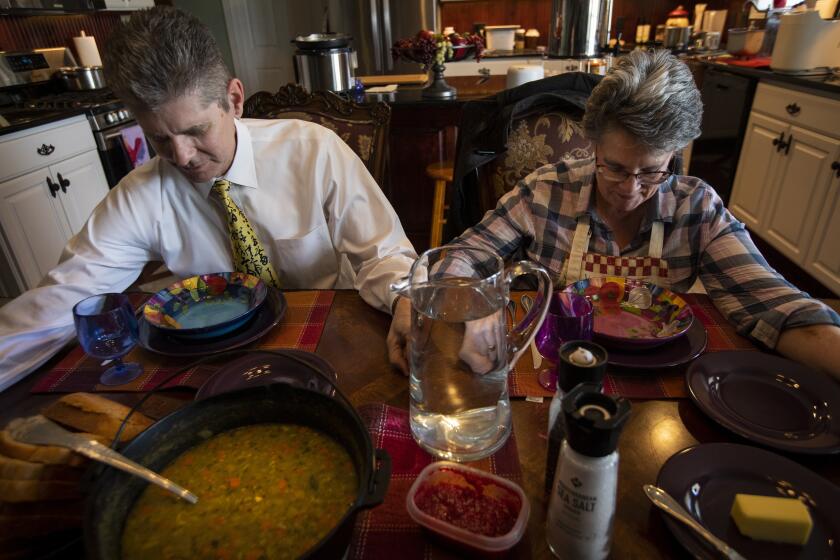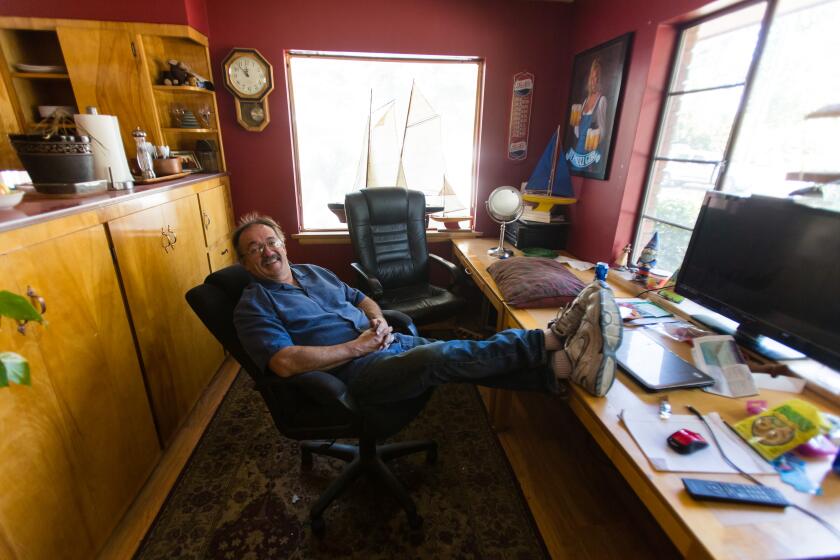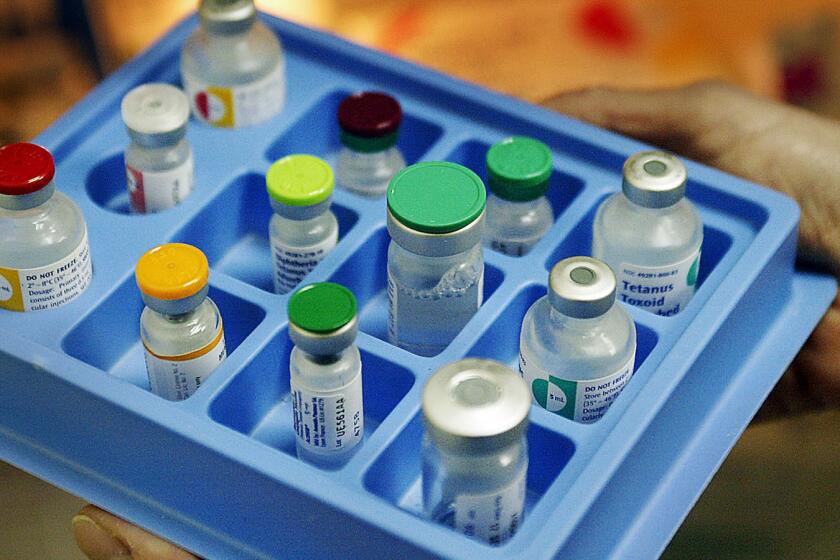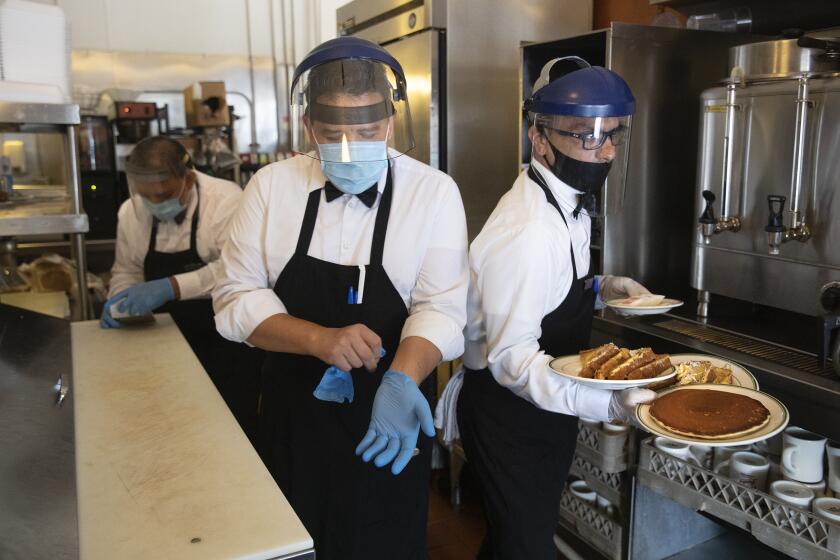Idaho coronavirus cases spike after businesses reopen
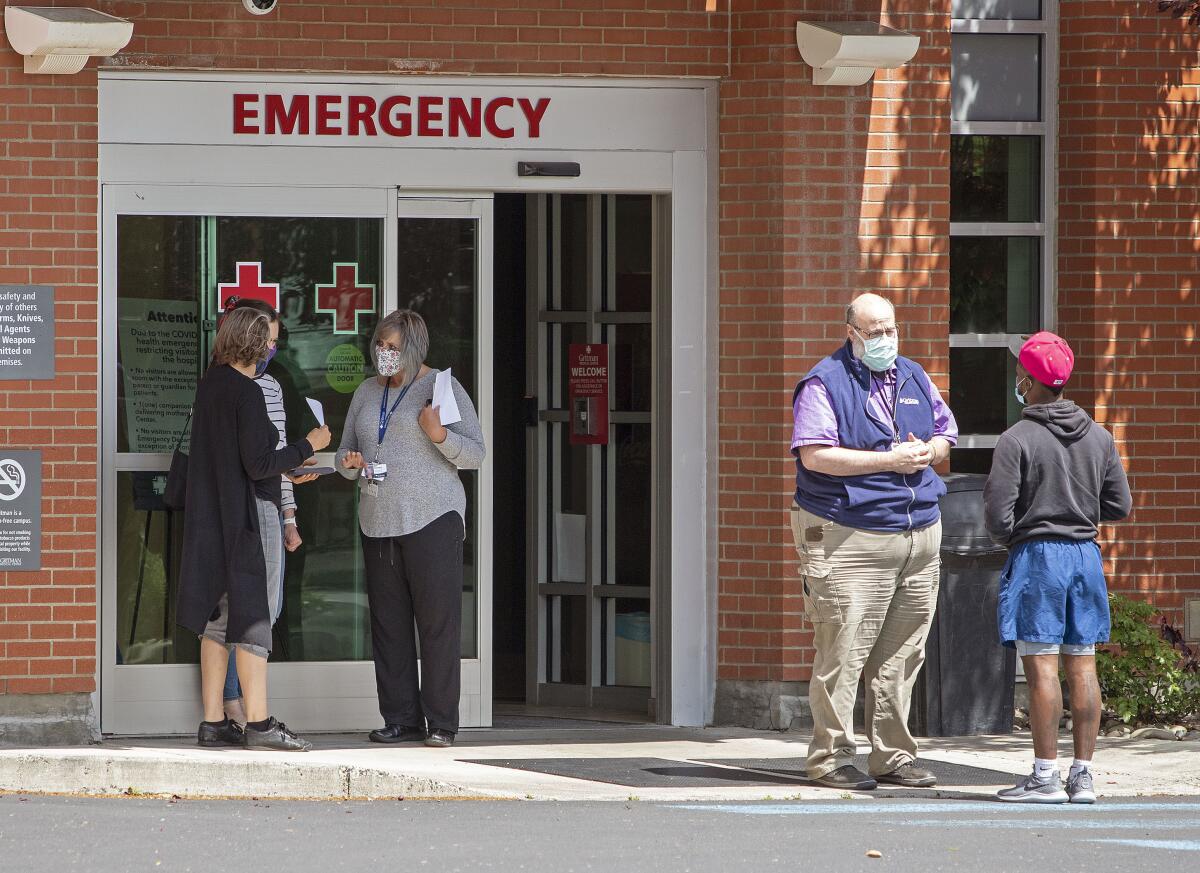
- Share via
BOISE, Idaho — For a time in Idaho, it seemed like the worst of the COVID-19 pandemic could be over. After an initial onslaught of confirmed cases in the spring, by June the numbers had dropped to a point that state leaders felt comfortable allowing businesses to reopen and life to get back to nearly normal.
But a new spike of coronavirus cases has prompted some concern. The number of daily confirmed new infections has quadrupled over the past two weeks to roughly 345 — nearly double what the numbers were during the state’s first outbreak.
“It’s alarming,” Idaho Gov. Brad Little said Monday.
Idaho is still far from being a national hot spot: The state ranks about 14th in the nation for new confirmed cases per capita, and death rates linked to COVID-19 are minimal here compared to other states, with about 5.4 deaths per 100,000 residents compared to about 171 deaths per 100,000 New Jersey residents, for example. Death reports can lag behind coronavirus diagnoses by weeks, however, so it’s too soon to tell if Idaho’s death rate will remain low.
Despite his concern, Little doesn’t anticipate shutting the state back down.
He insists that hospitals have sufficient capacity and stocks of personal protective equipment. But the heads of two major hospital systems in southwestern Idaho told regional public health officials Tuesday that testing systems are overwhelmed and stocks of protective gear could soon see shortages as well.
On his 2.5.-acre property in outside Idaho Falls, Idaho, 61-year-old David Gillmore has amassed years’ worth of food as store shelves go empty amid the coronavirus pandemic. As a Mormon, he is taught to always be ready for disaster.
Previous shutdown efforts have sparked protests. For the heavily Republican, agriculturally focused state, the coronavirus has highlighted an ongoing clash between ultraconservatives who abhor government mandates and traditional conservatives who believe science and individual responsibility will lead the way through the pandemic.
Idaho reached Phase 4 of Little’s four-step reopening plan in mid-June, allowing bars to reopen and large gatherings to resume as long as people wore masks and took other precautions such as social distancing. By the middle of the following week, however, health officials announced an outbreak linked to infected patrons who visited half a dozen Boise bars. Another outbreak was linked to a grocery store in central Idaho. And in eastern Idaho, officials reported that an infected patron spent more than eight hours at a bar.
Health professionals say the Boise area is experiencing exponential growth in the coronavirus caseload, and that doesn’t seem likely to change anytime soon.
“Our modeling shows week-after-week increases,” said Chris Roth, chief executive of St. Luke’s Medical System. “There’s nothing that we’ve been able to determine is going to change the trajectory at this point, given the collective behaviors of the community.”
Bashing newcomers from California is a cyclical sport with a long history in the heart of Idaho’s Treasure Valley.
Bruce DeLaney, who co-owns Rediscovered Books with his wife, said that responding to the pandemic had been a constant conversation at his home over the past several weeks. He doesn’t want to see Boise become another New York, at one point the nation’s biggest hot spot, where his mom and brother saw the toll of the virus firsthand.
“It’s tough hearing the stories out of there. You can’t talk to people who’ve been there and not have that color what’s going on here,” he said. “I have a staff, I have a family, our customers have families and I don’t want anybody getting sick because I made them come to work in unsafe conditions.”
The state’s introduction to COVID-19 started with a boom in March. Within days, Blaine County, home to the tony Sun Valley Resort, was under an emergency stay-at-home order amid a spike in cases sparked largely by out-of-state traffic to the region.
Yet many in the state were unconcerned. They still saw the coronavirus as a big-city problem, not something that could touch isolated ranching and farming towns where generations-old homesteads have withstood drought, blight and economic depressions. Social media posts with sentiments such as, “If you ever licked a salt block as a kid, you can’t get coronavirus,” started to become popular.
On March 25, Little expanded the stay-at-home order statewide. Within a few hours, the Republican governor was garnering both praise for taking decisive action and complaints from those who said he’d overstepped. Some extremely conservative lawmakers said mask recommendations and forced business closures violated residents’ personal freedoms.
Lt. Gov. Janice McGeachin was repeatedly critical of Little.
“I lose sleep at night because the heavy hand of our government is hurting so many Idahoans,” she wrote in a May editorial, adding that many residents were still waiting for unemployment benefits.
Idaho’s conservative lawmakers have long been reluctant to legislate medical matters, with frequent attempts to limit abortion, transgender care and other reproductive care issues being the big exceptions. The state is one of a few that still has “faith healing” exceptions to child abuse laws, allowing some parents to avoid prosecution if a child dies from lack of medical care. Idaho’s vaccination requirements are also flexible, allowing unvaccinated kids to attend school if their parent objects to vaccines.
With coronavirus on the rampage, perhaps the people who don’t believe in vaccinations will rethink their irresponsible position.
As a result, the state has pockets with very low vaccination rates, and Idaho has become a popular destination for so-called “anti-vax refugees” from California and other areas with stricter vaccination rules. That ethos has spread to the pandemic public policy debate, and anti-vaccine groups such as Health Freedom Idaho have joined forces with libertarian lobbying and think tank organization Idaho Freedom Foundation to protest the stay-at-home orders.
Hospital capacity seems to be adequate so far: As of Sunday evening, state health department officials said there had been 369 people hospitalized, 124 of whom were admitted to the ICU. The state still had just over 100 available ICU beds and 468 ventilators available as of Sunday, according to the Idaho Department of Health and Welfare.
DeLaney, like many other Idaho business owners, initially offered delivery services, then added curbside pickup and appointment-only shopping. Now numbers inside the store are limited and everyone must wear a mask and use hand sanitizer.
For the most part, he said customers have been understanding, though some have pushed back against the rules.
Health officials will be allowed to impose fines or revoke the permits of restaurants caught violating coronavirus guidelines.
“They are pleased that we seem to value their well-being over being the best capitalists that we can be,” he said.
Some local government leaders are taking action in the absence of a statewide mask mandate. Starting last Saturday, Boise’s mayor, Lauren McLean, made face coverings mandatory for people in public spaces where social distancing can’t be observed.
The order was met with relief by many, and protests by some. Health Freedom Idaho organized a protest that brought a few hundred people to Boise’s City Hall last Friday. Some protesters burned masks and chanted, “We will not comply!”
More to Read
Sign up for Essential California
The most important California stories and recommendations in your inbox every morning.
You may occasionally receive promotional content from the Los Angeles Times.
